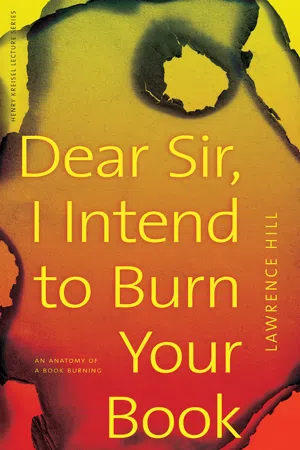
- 56 pages
- English
- ePUB (mobile friendly)
- Available on iOS & Android
About This Book
"Dear Sir, I Intend to Burn Your Book." Last June, I received an astonishing email from a man in The Netherlands who began with "Dear Sir Lawrence Hill" but who went on to say that he did not accept the title The Book of Negroes and would therefore burn my novel in a public park in Amsterdam. The astonishing array of events that led him to live up to his promise-while Dutch TV cameras rolled-made me think more broadly about all the different ways that books have elicited paranoid and violent responses over the years. The 17th century Italian scientist Galileo was jailed for the rest of his life and saw his writings banned because he dared to suggest that the Earth was not the centre of the universe. Perhaps it is tempting to assume that it was only in other lands and centuries that arguments were shut down, books banned, and authors imprisoned or executed for publishing their ideas. But the fear of ideas, and of the free expression of imagination and argument, continues to define modern approaches to literature. In recent years, I have seen Three Wishes by the award-winning Canadian author Deborah Ellis pulled from school shelves because it allowed Israeli and Palestinian children to speak about what it was like to live in a war zone, and the American writer Joyce Carol Oates' novel Foxfire yanked from study in an Ontario school because it contained profanities. Who is leading the charge to ban, censor, or control the distribution of books? Is it working? What price do we pay for these efforts? And where do we go from here?
Frequently asked questions
Information
Burn Your Book
Dear Sir Lawrence Hill,We, descendants of enslaved in the former Dutch colony Suriname, want let you know that we do not accept a book with the title “The book of Negroes.”We struggle for a long time to let the word “nigger” disappears from Dutch language and now you set up your book of Negroes! A real shame!That’s why we make the decision to burn this book on the 22nd of June 2011.Maybe you do not know, but June is the month before the 1st of July, the day that we remember the abolition from the Dutch, who put our ancestors in slavery.Sincerely,ROY GROENBERG,
Dear Mr. Groenberg,I am very sorry to hear of your plans to burn my book.Are you aware of the historical origins of the title? It is a historical novel. “The Book of Negroes” is the name of a British military ledger, that documented the exodus of 3,000 African Americans from New York City to Nova Scotia, Canada at the end of the American Revolutionary War. It is a very important genealogical document, as it provides a great deal of biographical information about the Blacks who migrated from the USA to Canada in 1783. The original copy of this document is kept in the National Archives in the UK. The document is central to my novel. My main character must have her name entered into “The Book of Negroes” before she, like 3,000 other Blacks fleeing American slavery, is allowed to sail to Canada.The use of the title, “The Book of Negroes” (or “Het Negerboek” in Dutch) has offered me the opportunity to explain this history, which is fascinating, important and troubling, to many thousands of readers in Canada, the UK, The Netherlands and elsewhere. I have found that when given the opportunity to see what I am doing in this book and with this title, readers understand that the title is not intended to be offensive, but that it is used historically, to shed light on a forgotten document and on a forgotten migration (that of thousands of Blacks from the USA to Canada in 1783).Did you know that I gave a talk recently about this book, its historical origins, and the title, to the Surinamese group NiNsee in Amsterdam last month?Before you proceed with your plans to burn my novel, would you like to have a conversation about this?Thank you,LAWRENCE HILL
Table of contents
- Cover
- Title Page
- Copyright
- Contents
- Foreword
- Liminaire
- Introduction
- Dear Sir, I Intend to Burn Your Book
- Notes
- About the Author
- Henry Kriesel Lecture Series